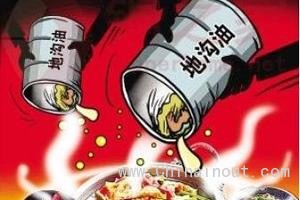連日來,,臺灣地溝油事件持續(xù)發(fā)酵。根據(jù)臺灣警方透露,,他們在屏東,、高雄發(fā)現(xiàn)經(jīng)營劣質(zhì)油品的地下工廠,以每公斤12元到20元新臺幣(約合為2.5元到4.1元人民幣)的價格非法收取食品回收油,,和俗稱“地溝油”的餿水油,、皮革廠廢棄皮脂油等摻混后,制成劣質(zhì)食用油,。這些問題油被臺灣地區(qū)知名油品企業(yè)強冠公司大量收購,,用于生產(chǎn)食用油產(chǎn)品“全統(tǒng)香豬油”。
根據(jù)臺灣當?shù)孛襟w的報道,,此次地溝油事件波及的廠商遍及臺灣全島,,諸如盛香珍、味王,、好帝一,、陸仕、欣冠、奇美,、味全,、祥有味、品高,、憶霖,、犁記等眾多知名企業(yè)、百年老店赫然在列,。此外,,問題油還流向許多小吃店、路邊攤等,。臺灣媒體甚至以“全島淪陷”來形容此次地溝油事件的惡劣影響,。
國家質(zhì)檢總局此前發(fā)公告表示“全統(tǒng)香豬油”沒有出口至大陸,國臺辦也發(fā)布聲明表示,,經(jīng)過核查,,大陸沒有進口臺灣“全統(tǒng)香豬油”,但是包括味全在內(nèi)的下游企業(yè)產(chǎn)品可能進入大陸市場,。據(jù)了解,,日前上海、廈門等地質(zhì)檢部門已經(jīng)發(fā)現(xiàn)并下架大量問題產(chǎn)品,。
地溝油實際上是一個泛指的概念,,是人們在生活中對于各類劣質(zhì)油的通稱。有的地溝油來自下水道中的油膩漂浮物,,有的則是劣質(zhì)豬肉,、豬內(nèi)臟、豬皮加工以及提煉后產(chǎn)出的,。
事件曝光后,,地溝油生產(chǎn)商、臺灣強冠公司董事長葉文祥在記者會上兩度下跪道歉,,稱愿用名下3億新臺幣資產(chǎn)進行賠償,。為證自家清白,葉文祥還當眾喝下一杯“全統(tǒng)烤酥油”,。不過,,其并未得到大家的諒解。
要想徹底鏟除危害人民群眾生命健康的這一“毒瘤”,,那么打擊地溝油的犯罪行動,,就應該常抓不懈,并制定相應的規(guī)章制度,,從源頭上加強餐廚廢棄物管理,。(中國進出口網(wǎng))

In recent days, many illegal cooking oil incidents happened in Taiwan. Taiwanese police said they found underground factories producing poor quality oil in Pingtung and Kaohsiung, these factories illegally collected food recycling oil at a price of NTD12 to 20 per kilogram (about ¥2.5 to ¥4.1). They produced poor quality edible oil by mixing up "waste oil" with the tannery waste sebum oil. These illegal oil is acquired in a large number by well-known oil company Qiang’guan in Taiwan, and used for the production of edible oil "scented lard".
Taiwan's local media reports, the incident spreads manufacturers all over the island of Taiwan, such as Sheng Xiangzhen, Ve Wong, Haoyidi, Lu Shi, Xin Guan, Chi Mei, Wei Chuan, Cheung flavored, Pingao, Yi Lin, Liji and many other well-known enterprises, even the century-old brand shop. In addition, the illegal oil also flows to many eateries, street vendors and so on. Taiwan’s media even use "occupied the island" to describe the adverse impact of the waste oil events.
AQSIQ has announced that "scented lard" wasn’t exported to mainland China, Taiwan Affairs Office also issued a statement that after verification, the mainland didn’t import "scented lard" from Taiwan but downstream business products including Wei Chuan’s may enter the mainland market. It is said that a few days ago quality inspection departments in Shanghai, Xiamen, ect. found a lot of illegal products and made them off the shelf.
Waste oil, in a broad sense, refers all kinds of low-grade oil in people’s life. Some waste oil is from the sewer greasy floating debris, while others are processed and refined from inferior pork, pig offal and the pigskin.
After the scandal, Ye Wenxiang, waste oil producer and chairman of Taiwan's Qiang’guan knelled twice in the press conference to apologize and said that he would like to compensate gratified by his assets worth NTD300 million. As evidence of their own innocence, Ye Wenxiang also publicly drank a cup of "scented baked butter". However, it did not get everyone's understanding.
In order to completely eradicate the "cancer" harm to people's lives and health, combat against waste oil criminal should not remitted, appropriate rules and regulations should be made and kitchen waste management should be strengthened from the source.
根據(jù)臺灣當?shù)孛襟w的報道,,此次地溝油事件波及的廠商遍及臺灣全島,,諸如盛香珍、味王,、好帝一,、陸仕、欣冠、奇美,、味全,、祥有味、品高,、憶霖,、犁記等眾多知名企業(yè)、百年老店赫然在列,。此外,,問題油還流向許多小吃店、路邊攤等,。臺灣媒體甚至以“全島淪陷”來形容此次地溝油事件的惡劣影響,。
國家質(zhì)檢總局此前發(fā)公告表示“全統(tǒng)香豬油”沒有出口至大陸,國臺辦也發(fā)布聲明表示,,經(jīng)過核查,,大陸沒有進口臺灣“全統(tǒng)香豬油”,但是包括味全在內(nèi)的下游企業(yè)產(chǎn)品可能進入大陸市場,。據(jù)了解,,日前上海、廈門等地質(zhì)檢部門已經(jīng)發(fā)現(xiàn)并下架大量問題產(chǎn)品,。
地溝油實際上是一個泛指的概念,,是人們在生活中對于各類劣質(zhì)油的通稱。有的地溝油來自下水道中的油膩漂浮物,,有的則是劣質(zhì)豬肉,、豬內(nèi)臟、豬皮加工以及提煉后產(chǎn)出的,。
事件曝光后,,地溝油生產(chǎn)商、臺灣強冠公司董事長葉文祥在記者會上兩度下跪道歉,,稱愿用名下3億新臺幣資產(chǎn)進行賠償,。為證自家清白,葉文祥還當眾喝下一杯“全統(tǒng)烤酥油”,。不過,,其并未得到大家的諒解。
要想徹底鏟除危害人民群眾生命健康的這一“毒瘤”,,那么打擊地溝油的犯罪行動,,就應該常抓不懈,并制定相應的規(guī)章制度,,從源頭上加強餐廚廢棄物管理,。(中國進出口網(wǎng))

In recent days, many illegal cooking oil incidents happened in Taiwan. Taiwanese police said they found underground factories producing poor quality oil in Pingtung and Kaohsiung, these factories illegally collected food recycling oil at a price of NTD12 to 20 per kilogram (about ¥2.5 to ¥4.1). They produced poor quality edible oil by mixing up "waste oil" with the tannery waste sebum oil. These illegal oil is acquired in a large number by well-known oil company Qiang’guan in Taiwan, and used for the production of edible oil "scented lard".
Taiwan's local media reports, the incident spreads manufacturers all over the island of Taiwan, such as Sheng Xiangzhen, Ve Wong, Haoyidi, Lu Shi, Xin Guan, Chi Mei, Wei Chuan, Cheung flavored, Pingao, Yi Lin, Liji and many other well-known enterprises, even the century-old brand shop. In addition, the illegal oil also flows to many eateries, street vendors and so on. Taiwan’s media even use "occupied the island" to describe the adverse impact of the waste oil events.
AQSIQ has announced that "scented lard" wasn’t exported to mainland China, Taiwan Affairs Office also issued a statement that after verification, the mainland didn’t import "scented lard" from Taiwan but downstream business products including Wei Chuan’s may enter the mainland market. It is said that a few days ago quality inspection departments in Shanghai, Xiamen, ect. found a lot of illegal products and made them off the shelf.
Waste oil, in a broad sense, refers all kinds of low-grade oil in people’s life. Some waste oil is from the sewer greasy floating debris, while others are processed and refined from inferior pork, pig offal and the pigskin.
After the scandal, Ye Wenxiang, waste oil producer and chairman of Taiwan's Qiang’guan knelled twice in the press conference to apologize and said that he would like to compensate gratified by his assets worth NTD300 million. As evidence of their own innocence, Ye Wenxiang also publicly drank a cup of "scented baked butter". However, it did not get everyone's understanding.
In order to completely eradicate the "cancer" harm to people's lives and health, combat against waste oil criminal should not remitted, appropriate rules and regulations should be made and kitchen waste management should be strengthened from the source.











